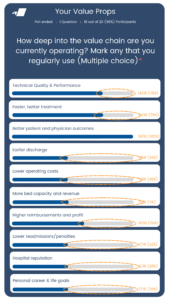Medical Device Sales Training Tips
The practices for the design and deployment of medical device sales training programs
Medical Device Sales Challenges
The healthcare sales environment presents unique challenges for sales reps and their leadership. Training programs need to address regulatory and market access constraints, the technical complexity of medical device products and, for those selling to healthcare professionals (HCPs), the need to effectively leverage short, time-pressured meetings.
Sales teams responsible for higher value medical device sales (often involving capital, or changes to customer workflows, or both) face additional challenges – they need to plan more complex sales strategies to gain buy-in from multiple stakeholders and decision makers, to navigate complex accounts such as Integrated Delivery Networks (IDNs), and to engage procurement professionals effectively to maintain margins and avoid commoditization.
Post-pandemic, it remains difficult to gain access for meetings in both acute and HCP settings. It’s increasingly important to make every meeting count.
Let’s look at the features of the best sales training programs.
Medical Device Sales Training Design
We’ve trained tens of thousands of salespeople – from those running high velocity (one- and two-meeting close) sales processes to enterprise teams landing seven year contracts with tens of millions of dollars of capital. We’ve seen the good, the bad and the ugly.
Here’s what we consider the critical parts of an effective sales training program.
Review and Update your Value Propositions Before you Deploy Training
Not all healthcare sales are the same. Medical device sales are dramatically different to pharmaceutical sales, which tend to be heavily “product-based”.
Many (in fact, most) medical device sales reps spend too much time talking to customers about product, and not enough about their customers’ business, personal goals and pain points. It is the latter that really provide “sales leverage” – the “care-abouts” that encourage customers to make decisions and move off the status quo.
Here’s a real-life example, taken from an experienced group of enterprise sales executives prior to training. You’ll see the bias towards product discussions. By stretching a team’s skills and comfort levels beyond product and towards operational, financial and personal value, dramatic productivity lifts are possible – they are now talking about the stuff that customers care about.
 Real-life pre-training survey of experienced enterprise salespeople – Blue bars show where they spend their time in customer discussions – notice the product-heavy focus. The dashed orange section shows “untapped sales leverage” that great training can help to unlock.
Real-life pre-training survey of experienced enterprise salespeople – Blue bars show where they spend their time in customer discussions – notice the product-heavy focus. The dashed orange section shows “untapped sales leverage” that great training can help to unlock.
Use Customized Role Plays and High Fidelity Simulations
Many salespeople hate role plays during training, but in our experience it is by far the most effective way to surface sales skills gaps and positively change behavior. The best sales training helps your salespeople to fast track their medical sales career – it is the “A-ha” moments that come from these role plays that deliver that growth.
Off-the-shelf training programs rarely work well. Invest the time to build customized sImulation scenarios focused on the most difficult and consequential meeting types in your sales process. For example, for an enterprise sale, you might simulate the first C-Suite meeting for a new prospect, or an early meeting with procurement in a retention / contract renewal scenario.
If your trainers are experienced enough, you can introduce video-recording, playback and analysis, this format can be highly effective not just for your new hires and mid-performers, but even your President-Club veterans. It also opens up some valuable coaching opportunities for your front-line managers (see below).
Break the Training into Modules
An initial “core” curriculum should provide the common language across the whole sales team essential to alignment, efficient planning and coaching. This “common core” should include a review of value propositions, simple territory and account planning, forecasting and reporting, pre-call planning and sales skills).
Segment your team by role (e.g. enterprise and national accounts, mid-market, SMB, market access/GPOs, physician office). The balance of your training program can then provide follow-on training with modules relevant to each role (for example, negotiation skills may only be relevant for a national accounts and enterprise teams).
Mix the training delivery format up (team field check-ins and debriefs, podcasts, deal reviews, joint sales calls and of course manager field travel).
Less Product Training, More Business Acumen Training
It’s easy to commoditize a product – it’s much harder to commoditize a business solution.
Solid product knowledge is obviously important to be able to credibly engage prospects and customers. But we often see too much product training deployed, and it often comes at the expense of the business acumen that supports effective engagement with non-technical buyers. As the deal size and complexity goes up, your product features become less relevant, and exploring and capturing customer pain points and business value become the key skills.
The sad truth is, nobody cares about your product – they only care about what it can do for them and their business.
We often see newly hired sales reps outperforming the 15-year veterans precisely because they know less about the product, and therefore they talk less about the product and engage prospects as consultants rather than product specialists.
Invest in your Front-line managers
Front-line manager coaching is often the weakest link in medical device sales teams. Untrained leaders tend to lack the coaching skills that help lift the productivity of the “mid-pack” sales reps, and often lack the leadership and motivational skills needed for retention of your best performing salespeople.
Great salespeople leave poor bosses.
Most managers have a full time job “pushing deals”. If you can help them understand the value of coaching people, and building the capability of their reps’ independent performance, you can start to build truly scalable productivity growth.
Invest a significant share of your training and sales enablement budget (we typically suggest around 35%, or 3x the budget you would allocate to reps) in supporting your front-line manager coaching skills. Every dollar invested here will have an outsize return on productivity.
Reinforce and Sustain Skills with your Field Tools
Training as an “event” or a series of events rarely sticks. Around 90% of sales training content is lost within 30 days.
Research from Xerox shows that only a fraction retain the content; 13% to be exact. The company found that 87% of new skills are lost within a month of sales training.
Your sales team’s field tools and the workflows that they create are the best way to retain the skills and mindset after training. We find the most important tools for medical device teams are:
- Account Planning – a simple account planning template, regularly reviewed, is best. (Too many medical device teams overcomplicate this – we favor the “KISS” principle)
- Pre-Call Planning – often overlooked, but one of the most important tools both for driving rep productivity and discipline. The ability to plan for and execute the difficult sales calls well is what separates the good from the great medical device sales reps. But a robust pre-call planning process also forms the basis for rep coaching by managers.
- Manager coaching tools – preferably integrated with your CRM to create a regular coaching cadence so that “people coaching” can be implemented in parallel with “deal coaching”.
Testimonials, case studies – but medical sales representatives don’t rely on them (everything looks like a nail when you’re holding a hammer). Every medical device company loves their product – but…
Check out a case study by one of our med device clients below!
Sales Training Trusted by Some of the Biggest Medical Device Companies!
Want sales training that’s guaranteed to pay for itself within three months? You’re in the right place…
- Brilliantly simple and effective skills to move beyond price, navigate higher in your client organizations and sell on value
- Modular curriculum – fully customized to your business, your deals and your market
- Available in-person or remote, anywhere in the world, and licensable for internal delivery
